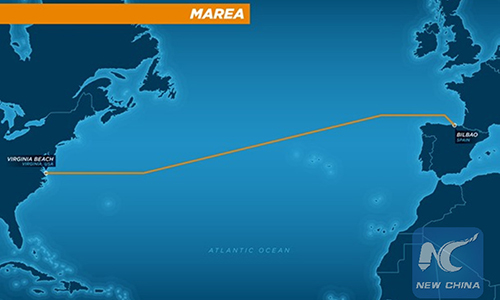HOME >> SCI-TECH
Microsoft, Facebook to build high-speed transatlantic subsea cable
Source:Xinhua Published: 2016-5-28 11:40:54

A map on Microsoft's official website shows a high-speed undersea cable across the Atlantic Ocean co-invested by Facebook and Microsoft. Photo: Xinhua
US tech giants Microsoft and Facebook announced Thursday they would jointly build a high-speed undersea cable across the Atlantic to give customers fast and reliable access to the two companies' cloud and online services as demand surges.
The new 6,600-kilometer undersea cable system, dubbed MAREA, will be the first to connect the United States and southern Europe, stretching from Virginia Beach, in the US state of Virginia, to Spanish city Bilbao and then beyond to network hubs in Europe, Africa, the Middle East and Asia.
MAREA is composed of eight fiber pairs and features an initial estimated design capacity of 160 Tbps. It will be the highest-capacity subsea cable to ever cross the Atlantic, the two companies said in a statement.
The construction of the cable will start this August and is expected to be completed in October 2017. Spanish telecommunications infrastructure company Telxius will operate and manage the cable system after its completion.
The laying of new global Internet infrastructure is driven by a skyrocketing data consumption. Microsoft said that it sees an ever-increasing customer demand for reliable, high-speed connections for its cloud platform, including search engine Bing, productivity software Office 365 and its Azure cloud services. Facebook runs instant messaging services like Messenger and WhatsApp in addition to its social networking service.
"This robust, global infrastructure will enable customers to more quickly and reliably store, manage, transmit and access their data in the Microsoft Cloud," the company said.
Microsoft and Facebook designed MAREA to be interoperable with a variety of networking equipment. The companies said that the design will allow customers to benefit from lower costs and easier equipment upgrade which brings about faster growth in bandwidth rates, since the cable system can evolve at the pace of optical technology innovation.
Undersea cables carry the majority of transoceanic digital data, which includes telephone, Internet and private data traffic. While undersea cable systems are traditionally built by telecommunication companies, US tech companies are increasingly foraying into the submarine cabling market. According to market research firm TeleGeography, Google has invested or plans to invest in five subsea cables, Microsoft four, Facebook two and Amazon one.
Posted in: IT